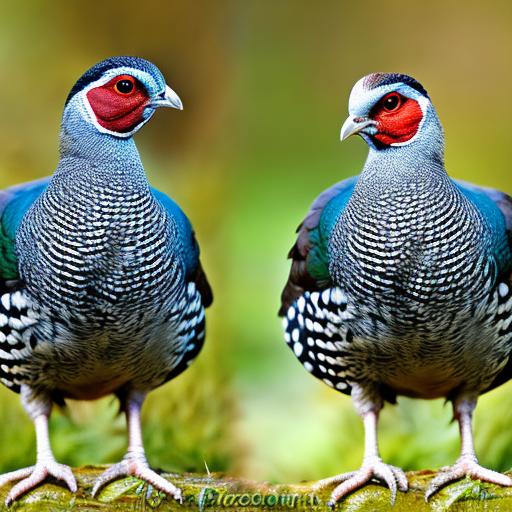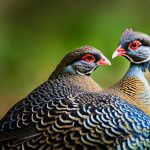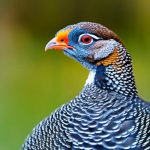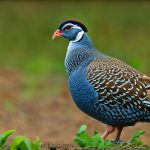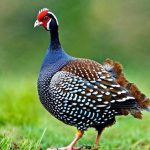Guinea fowl, also known as pintades, are native to the African continent and have been domesticated for thousands of years. They are popular for their unique appearance, with speckled feathers and a distinctive call that sets them apart from other poultry. Guinea fowl are known for their excellent foraging abilities, making them a valuable addition to any farm or homestead. In New Zealand, guinea fowl are becoming increasingly popular for their pest control abilities, as they are voracious insect eaters and can help keep the population of ticks, flies, and other pests in check. Additionally, guinea fowl are valued for their flavorful meat and nutritious eggs, making them a versatile and valuable addition to any smallholding or farm.
Guinea fowl are hardy birds that can adapt to a wide range of climates, making them well-suited to the varied conditions found in New Zealand. They are also known for their alert and watchful nature, making them excellent guards for other poultry and livestock. Guinea fowl are social birds that thrive in small flocks, and they are known for their strong flock instincts and tight-knit social structure. While they can be somewhat noisy, their vocalizations can also serve as an effective alarm system, alerting farmers to the presence of predators or other potential threats. Overall, guinea fowl are a unique and valuable addition to any farm or homestead in New Zealand, offering a range of benefits from pest control to meat and egg production.
Key Takeaways
- Guinea fowl are native to Africa and are known for their insect-eating abilities and loud calls.
- Keeping guinea fowl in New Zealand can help control pests like ticks and grasshoppers, and their eggs are a good source of protein.
- Guinea fowl require a secure coop with at least 3-4 square feet of space per bird and access to a large outdoor area.
- In New Zealand, guinea fowl can be fed a diet of commercial poultry feed supplemented with greens, insects, and grit.
- Regular health checks, vaccinations, and proper hygiene are essential for preventing diseases in guinea fowl.
Benefits of Keeping Guinea Fowl in New Zealand
There are numerous benefits to keeping guinea fowl in New Zealand, making them an attractive option for farmers and homesteaders. One of the primary benefits of guinea fowl is their excellent pest control abilities. Guinea fowl are voracious insect eaters and can help keep the population of ticks, flies, and other pests in check. This can be particularly valuable in New Zealand, where pests such as the Australian bush fly and the common tick can pose significant challenges for farmers and livestock. By introducing guinea fowl to their property, farmers can reduce the need for chemical pesticides and other pest control measures, creating a more sustainable and environmentally friendly farming operation.
In addition to their pest control abilities, guinea fowl are also valued for their flavorful meat and nutritious eggs. Guinea fowl meat is lean and richly flavored, making it a popular choice for gourmet chefs and home cooks alike. Guinea fowl eggs are also prized for their rich flavor and high nutritional value, making them a valuable addition to any farm or homestead. By keeping guinea fowl, farmers in New Zealand can diversify their income streams and offer unique and high-quality products to their customers. Overall, the benefits of keeping guinea fowl in New Zealand are numerous, from pest control to meat and egg production, making them a valuable addition to any farming operation.
Housing and Space Requirements for Guinea Fowl
When it comes to housing guinea fowl in New Zealand, there are several important considerations to keep in mind. Guinea fowl are hardy birds that can adapt to a wide range of climates, but they do require adequate shelter from the elements. A well-ventilated coop or shelter is essential to protect guinea fowl from extreme temperatures, wind, and rain. The coop should also provide roosting space for the birds, as well as nesting boxes for egg-laying hens. Additionally, it’s important to provide ample space for the birds to move around and exercise, as guinea fowl are active and social creatures that thrive in small flocks.
In terms of space requirements, guinea fowl need at least 3-4 square feet of indoor space per bird in the coop, with additional outdoor space for foraging and exercise. It’s important to provide a secure outdoor area for the birds, as guinea fowl are excellent flyers and can easily escape from an inadequately fenced enclosure. The outdoor space should also include access to grassy areas, as well as dust bathing areas and natural perches for the birds to roost on. Overall, providing adequate housing and space for guinea fowl is essential to their health and well-being, and careful consideration should be given to their housing needs when keeping them in New Zealand.
Feeding and Nutrition for Guinea Fowl in New Zealand
Feeding guinea fowl in New Zealand requires careful attention to their nutritional needs and dietary preferences. Guinea fowl are primarily ground feeders and prefer to forage for much of their diet, consuming a wide variety of insects, seeds, and vegetation. In addition to foraging, guinea fowl should be provided with a balanced commercial poultry feed that is specifically formulated for their nutritional needs. This feed should contain a mix of grains, protein sources, vitamins, and minerals to support the health and productivity of the birds.
In addition to commercial feed, guinea fowl can also benefit from supplemental treats such as mealworms, fruits, and vegetables. These treats can be used as a way to supplement the birds’ diet and provide additional nutrients and variety. It’s important to provide access to clean water at all times, as guinea fowl have high water requirements, especially during hot weather or when laying eggs. Overall, providing a balanced diet that meets the nutritional needs of guinea fowl is essential to their health and productivity in New Zealand.
Health and Disease Management for Guinea Fowl
Maintaining the health of guinea fowl in New Zealand requires careful attention to disease management and preventative care. Like all poultry, guinea fowl are susceptible to a range of diseases and parasites that can impact their health and productivity. It’s important to provide regular veterinary care for the birds, including vaccinations and parasite control measures. Additionally, good hygiene practices are essential to preventing the spread of disease within the flock.
Common health issues that can affect guinea fowl include respiratory infections, coccidiosis, and external parasites such as mites and lice. Regular health checks should be conducted to monitor the birds for signs of illness or distress, and any sick or injured birds should be isolated from the rest of the flock to prevent the spread of disease. Providing a clean and well-maintained living environment for the birds is also essential to preventing disease and promoting good health. Overall, proactive disease management and preventative care are essential to maintaining the health and well-being of guinea fowl in New Zealand.
Breeding and Reproduction of Guinea Fowl in New Zealand

Breeding guinea fowl in New Zealand can be a rewarding endeavor, but it requires careful attention to the birds’ reproductive needs and behaviors. Guinea fowl are seasonal breeders that typically begin laying eggs in the spring and continue through the summer months. To encourage successful breeding, it’s important to provide a suitable nesting area for the hens, as well as access to clean water and a balanced diet that meets their nutritional needs.
Guinea fowl eggs require an incubation period of approximately 28 days before hatching, and it’s important to provide a suitable incubator or broody hen to hatch the eggs successfully. Once hatched, guinea keets require careful attention and protection from predators, as they are vulnerable in their early days. Providing a warm and secure brooding area is essential to the survival of the keets, as well as access to a balanced diet that meets their nutritional needs. Overall, breeding guinea fowl in New Zealand requires careful attention to the birds’ reproductive needs and behaviors, but it can be a rewarding way to expand your flock and produce new generations of birds.
Tips for Successfully Keeping Guinea Fowl in New Zealand
Successfully keeping guinea fowl in New Zealand requires careful attention to their housing, feeding, health care, and reproductive needs. Providing a well-ventilated coop or shelter with ample space for the birds to move around is essential to their health and well-being. Additionally, providing access to a balanced diet that meets their nutritional needs is essential to their productivity and overall health.
Regular veterinary care is also important for maintaining the health of guinea fowl in New Zealand, including vaccinations and parasite control measures. Good hygiene practices are essential to preventing the spread of disease within the flock, so it’s important to keep their living environment clean and well-maintained.
When breeding guinea fowl in New Zealand, it’s important to provide a suitable nesting area for the hens and access to clean water and a balanced diet that meets their nutritional needs. Providing a warm and secure brooding area is essential to the survival of the keets once hatched.
Overall, successfully keeping guinea fowl in New Zealand requires careful attention to their specific needs and behaviors, but with proper care and management, they can be a valuable addition to any farm or homestead in New Zealand.
If you’re interested in keeping guinea fowl in New Zealand, you may also want to check out this informative article on creating the perfect farmhouse chicken coop on PoultryWizard. This article provides valuable insights into designing a comfortable and functional coop for your guinea fowl, ensuring they have a safe and secure environment to thrive. Learn more about creating the ideal farmhouse chicken coop here.
FAQs
What are guinea fowl?
Guinea fowl are a type of bird native to Africa. They are known for their distinctive spotted feathers and loud, chattering calls.
What do guinea fowl eat?
Guinea fowl are omnivorous and will eat a variety of foods including insects, seeds, and small fruits. They are also known to forage for food on the ground.
How do I keep guinea fowl in New Zealand?
To keep guinea fowl in New Zealand, you will need to provide them with a secure and spacious enclosure, as well as access to fresh water and a balanced diet. It is also important to consider the local climate and provide appropriate shelter for the birds.
Are guinea fowl noisy?
Yes, guinea fowl are known for their loud and chattering calls, especially when they feel threatened or are alerting others to potential danger.
Do guinea fowl require special care?
Guinea fowl require similar care to other poultry, including regular access to food and water, protection from predators, and appropriate shelter. They are also known to be good foragers and can help control insect populations in the area where they are kept.
Meet Walter, the feathered-friend fanatic of Florida! Nestled in the sunshine state, Walter struts through life with his feathered companions, clucking his way to happiness. With a coop that’s fancier than a five-star hotel, he’s the Don Juan of the chicken world. When he’s not teaching his hens to do the cha-cha, you’ll find him in a heated debate with his prized rooster, Sir Clucks-a-Lot. Walter’s poultry passion is no yolk; he’s the sunny-side-up guy you never knew you needed in your flock of friends!

